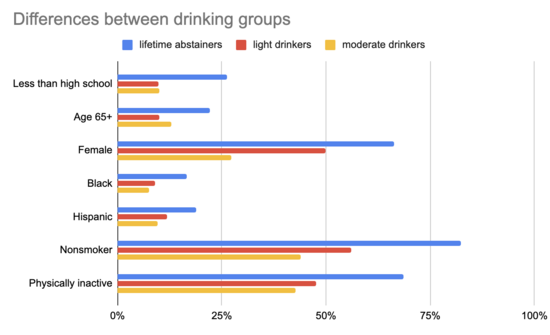Is Light Drinking Protective? |
July 30th, 2023 |
| alcohol, health |
The study finds:
Compared with lifetime abstainers, current infrequent, light, or moderate drinkers were at a lower risk of mortality from all causes, CVD, chronic lower respiratory tract diseases, Alzheimer's disease, and influenza and pneumonia. Also, light or moderate drinkers were associated with lower risk of mortality from diabetes mellitus and nephritis, nephrotic syndrome, or nephrosis.
To get this association they analyzed data from the NHIS survey, which includes questions on drinking habits, and the linked death records.
As you might expect, lifetime abstainers look quite different from light and moderate drinkers. For example, 26% of lifetime abstainers had less than a high school education, while only 10% of light or moderate drinkers did. The lifetime abstainer group is also a lot older (22% 65+ vs 10% or 13%), more female (66% vs 50% or 27%), more Black (17% vs 9% or 8%), more Hispanic (19% vs 12% or 10%), more nonsmoker (82% vs 56% or 44%), and more physically inactive (69% vs 48% or 43%). See the full table. Visually:
These are really big!
Now, they did adjust for these, along with many other differences between these groups:
The above-mentioned associations were investigated by adjusting for the following covariates: age, sex, race, or ethnicity (model 1); model 1 plus education level, physical activity, body mass index, smoking status, hypertension, heart disease, stroke, cancer, diabetes, asthma, emphysema, or chronic bronchitis in a separate model (model 2).
The problem is, there could easily be other important confounders. If something they are not adjusting for leads to both abstinence from alcohol and higher mortality, they aren't able to distinguish that from the causal effect of alcohol on mortality.
They do explicitly list this concern, the first one in their list of limitations, and it's always something I'm worried about with correlational studies. But this is worse than usual: the known differences between these groups going into the study are so large that I am very skeptical that adjusting for these is enough to cover the unknown differences. So I haven't updated my views appreciably from this study.
(I don't drink, but not for health reasons.)
Comment via: facebook, lesswrong, mastodon
